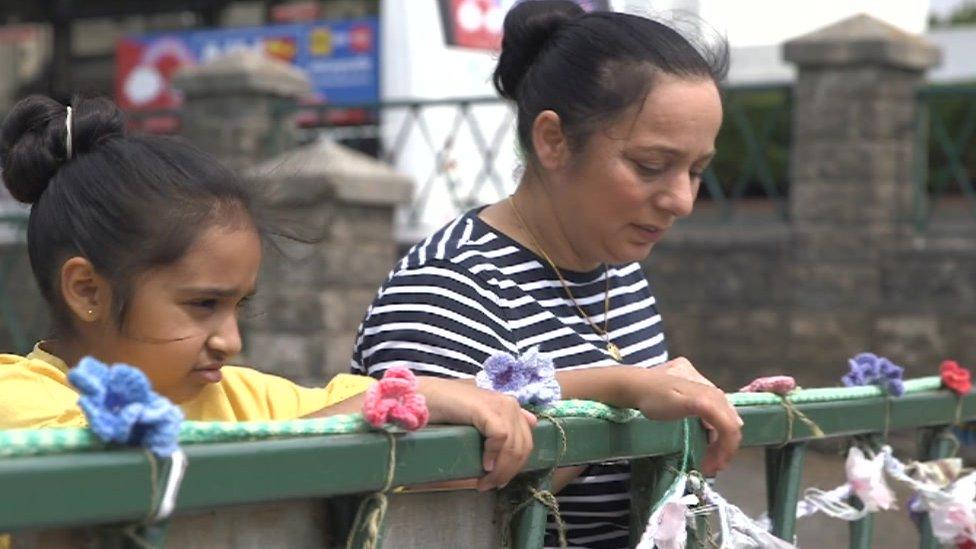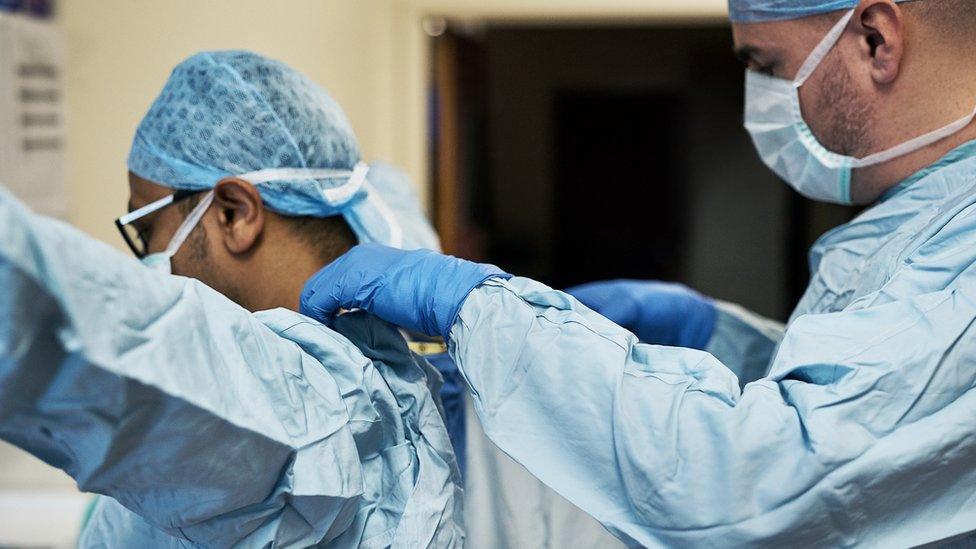Coronavirus: Women make up two-thirds of cases in Wales
- Published
Nurse Navjit Kaur tested positive for coronavirus on the same day her colleague died
Women make up nearly two-thirds of all confirmed coronavirus cases, figures from Public Health Wales have shown.
Senior nurse Navjit Kaur tested positive for coronavirus on the same day her friend died with it.
She said the fact there were more women in the nursing profession meant they were more likely to catch it.
The Wales TUC said the figures should be used to recognise women working on the front line in health and social care are "underpaid and undervalued".
Four out of five people working in health and social care in Wales are women, according to figures from the Office of National Statistics (ONS).

Agency nurse Leilani Medel died after contracting coronavirus at work
Mrs Kaur, 40, from Barry, was diagnosed on the same day her friend Leilani Medel, who was also a nurse, died with coronavirus.
The mother-of-one, who works in a nursing home, said it was "impossible" to socially distance when caring for someone, especially when clients with dementia become upset.
She said: "I'm a nurse and I have a natural instinct to go and hold their hands, to try to reassure them."
Mrs Kaur isolated herself in her bedroom, with her eight-year-old daughter communicating with her from the room next door.
"I was worried about my family, how they were going to cope without me if anything happens," said Mrs Kaur, who has since recovered.
"Even though I've recovered and am back to work, there's a fear in my mind still."
The official figures from PHW show 64% of all coronavirus cases diagnosed have been in women.

Navjit Kaur says she was frightened for her family if anything were to happen to her
Shavanah Taj, Wales TUC's General Secretary, said poor quality personal protective equipment (PPE) has a particular impact on women.
"A lot of the PPE still does not fit women correctly and there's a real gap as far as the manufacturing around the appropriate sizing for PPE is concerned," she said.
"Sectors women are predominantly focused in, those are the sectors that have been classed as front line and as key to us during the pandemic.
"Those are the workers that need to be valued and those are the ones that need to be protected and to be paid the proper wages that are required for those jobs."

A SIMPLE GUIDE: How do I protect myself?
IMPACT: What the virus does to the body
RECOVERY: How long does it take?
ENDGAME: How do we get out of this mess?

Health policy expert Dr Clare Wenham, from the London School of Economics, said the apparent difference in infection rates may be because testing initially focused on healthcare workers, the majority of whom are women.
But she said women were potentially more exposed to the virus because they are more likely to be in care-giving roles in the home and are also more likely than men to seek medical help if they become unwell.
Dr Wenham said higher infection rates in women had also been seen in data during the Ebola, cholera and Zika outbreaks.
Meanwhile, men made up 56% of Covid-related deaths in Wales between March and April, according to the ONS, although it is not yet known why.
And a report by a Welsh Government advisory group into the impact of Covid-19 on BAME communities found systemic racism may have contributed to increased risks of the virus on Wales' black, Asian and minority ethnic communities.
A Welsh Government spokesperson said: "There are a number of factors which affect the demographics of those being tested for Covid-19.
"Wales' initial approach to testing focused on protecting the most vulnerable to the virus, such as those working in hospitals and care homes, as well as those providing essential front-line services.
"In April and May respectively, we extended our testing to include critical workers and then to symptomatic members of the public to support the implementation of Wales' Test, Trace, Protect strategy."
- Published4 June 2020

- Published22 June 2020

- Published24 June 2020
